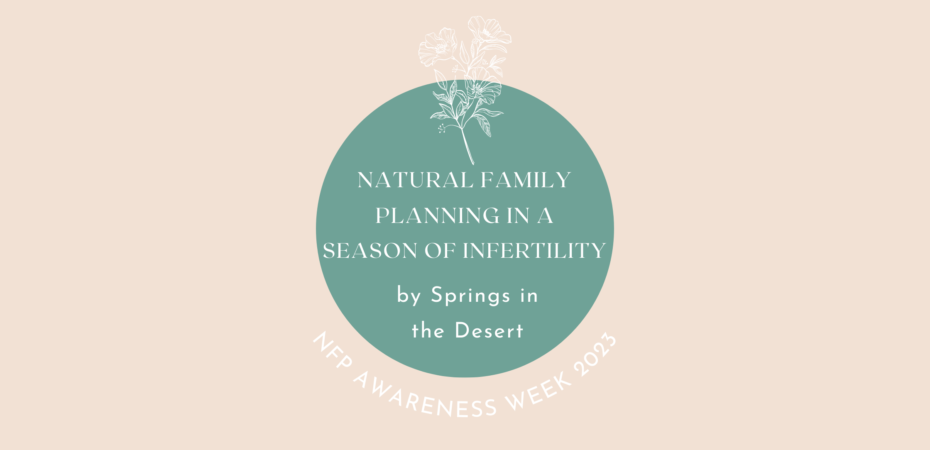
By Springs in the Desert
Natural Family Planning is a tool that helps us recognize the complex and beautiful designs of our bodies. Nearly every Catholic couple is introduced to it as part of their preparation for the Sacrament of Marriage, and while there is usually some mention of its usefulness in helping couples struggling to become pregnant, the emphasis is most often on NFP’s effectiveness in avoiding pregnancy. This is understandable since so many couples are either already contracepting or plan to use contraception in the future. Thus, the often-quoted statistic that NFP is 99% effective refers to avoiding pregnancy – not to how well it can assist in facilitating conception.
Approximately one in five couples experience infertility. For Catholic couples seeking to adhere to the Church’s wise and beautiful teachings on marriage and sexuality, but who struggle to conceive, the relationship with NFP can become somewhat complicated. On the one hand, it is very helpful to become aware of their fertile window and identify possible underlying conditions that may be negatively impacting fertility. On the other hand, however, couples who are charting in a season of infertility – especially for a prolonged time – may find NFP to be challenging.
Couples may become disillusioned with how little control they really have over “planning” their family. The language of using charting to “achieve” pregnancy can hint that, if one just puts in enough effort, there will be success. A couple trying to conceive in a season of infertility may come to believe that if they don’t “achieve” the goal of conceiving, then they have failed. If left unchecked, charting, treatment, and timing can become all-consuming, and “failure” can cause emotional, spiritual, and marital conflict.
Because it requires nearly constant awareness and analysis of their body’s fertility markers, women who are struggling with infertility can feel as if they have been reduced to their physicality alone. It is important for couples to be reminded that their spiritual, mental, emotional, and relational health is important, and must be factored into discernment of what method to use, when to take a break, and whether using NFP is still beneficial for them.
In Her wisdom, the Church is concerned with maintaining the integrity of the procreative and unitive aspects of the marital act. The problem with contraception is that it removes the procreative component. Likewise, using NFP in an unbalanced way may take a toll on the unitive aspect of marriage. Couples in a season of infertility need to know that the unity and intimacy of their marriage are more important than their adherence to any method or program.
Focusing on the more holistic aim of reproductive health and fertility awareness, rather than planning/achieving/avoiding conception can be very freeing. Instead of seeing their bodies as failures, or obstacles, women can embrace the fact that they are worthy of loving care and healing regardless of what their bodies can or cannot produce. Certain methods such as the Creighton Model can be particularly helpful in detecting underlying reproductive health problems so they can be properly treated. It is a tremendous gift when charting and treatments lead to improvements in quality of life through pain relief and restoring hormonal balance.
A broader understanding of the inherent fruitfulness of the one-flesh union of husband and wife is also helpful in navigating the NFP conversation. There will be times in all marriages when physical, biological fruitfulness will not occur. Whether couples are abstaining for serious reasons, experiencing infertility, or passed their childbearing years, they can bear fruit in all seasons through their union with each other in Christ. We cannot control the type of fruit our marriages will bear, but we can receive it all as a gift we have been given to share with the world.
Springs in the Desert is a Catholic infertility ministry that accompanies those struggling with infertility by offering a place of respite and solidarity where they can know God’s love for them and discover His unique call to fruitfulness. Visit our website for accompaniment, resources, our podcast, and more.

